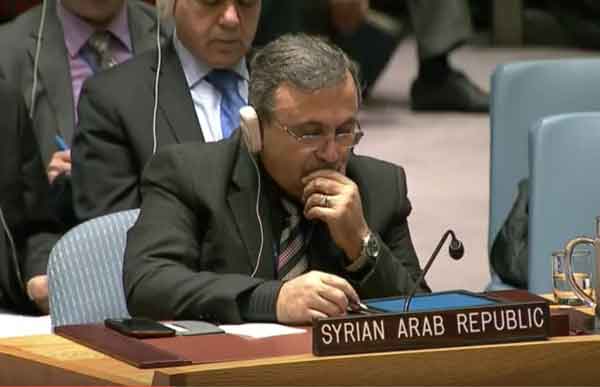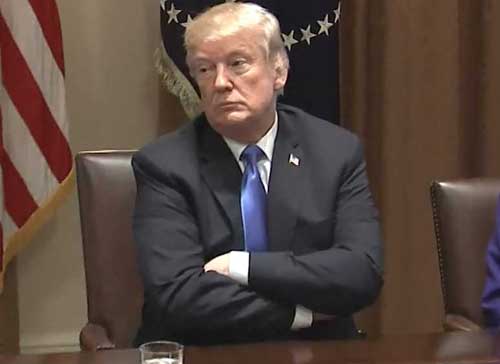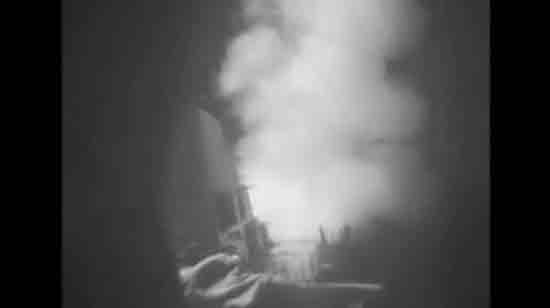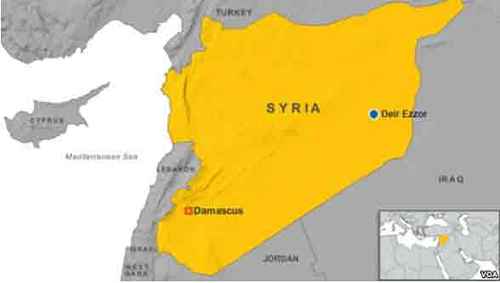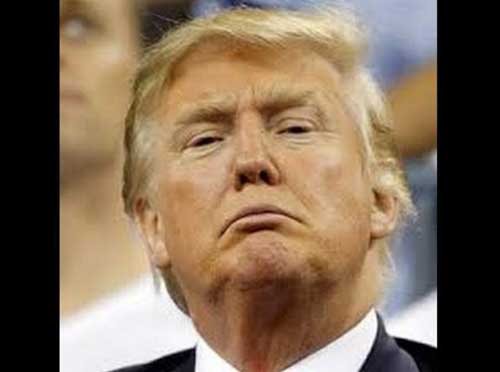U.S. President Donald Trump addressed the Nation Thursday night.
“On Tuesday Syrian President Bashar al-Assad launched a horrible chemical attack on innocent civilians using a deadly nerve agent. … Tonight I ordered a targeted military strike on the airfield in Syria from where the chemical attack was launched,” Trump said.
“It is in this vital national security interest of the Untied States to prevent and deter the spread and use of deadly chemical weapons.”
Trump called on all civilized nations to join the U.S. “in seeking an end to the slaughter and bloodshed in Syria.”
Reaction
Syrian state TV called the U.S. strike an act of “aggression.” While a Turkish-based Syrian opposition group, the Syrian Coalition, welcomed the U.S. attack, saying it puts an end to an age of “impunity” and said the military action should continue.
Early Friday, Russian President Vladimir Putin said the attack was “in violation of international law” and will “inflict major damage on U.S.-Russia ties,” according to spokesman Dmitry Peskov in a statement.
U.S. officials said the the Russian government was given advance warning of the airstrikes. “Military planners took precautions to minimize risk to Russian or Syrian personnel located at the airfield,” said Pentagon spokesman Captain Jeff Davis.
Russia said it would seek an urgent meeting of the U.N. Security Council to discuss the Syria attack.
Syria ally Iran also condemned the U.S. military action.
Chinese leader’s visit
The airstrike came as Trump entertained Chinese President Xi Jinping at the president’s Mar-a-Lago retreat.
Trump did not announce the attacks in advance, although he and other national security officials ratcheted up their warnings to the Syrian government throughout the day Thursday.[xyz-ihs snippet=”adsense-body-ad”]”I would tell you that the response from our allies, as well as the region and the Middle East has been overwhelmingly supportive of the action we taken,” Tillerson said. He is scheduled to travel to Russia next week.
Leaders from countries allied with the U.S. — Germany, France, Israel, Saudi Arabia and Turkey, along with several others — voiced support for the early-morning strike.
Pentagon spokesman Davis said military planners “took precautions” to limit risks to Russian and Syrian personnel at the airfield. Syria’s military, however, said Friday morning that six people had been killed and several others wounded in the attack.
Surprise action
The surprise action marked a striking reversal for Trump, who warned as a candidate against the U.S. getting pulled into the Syrian civil war, now in its seventh year. But the president appeared moved by the video and photos of children killed in that chemical attack, calling it a “disgrace to humanity” that crossed “a lot of lines.”
Just last week, the White House backed away from the former Obama administration’s stance that Assad must be removed from power.
While Trump did not say whether he now thought, in the wake of the gas attack, Assad should be driven from power, Tillerson said earlier Thursday Assad had to go and that there was “no role for him to govern the Syrian people” in the future.
The six-year civil was had killed hundreds of thousands of people and displaced millions, contributing to the largest refugee crisis since the end of World War Two.
UN discussions
At the United Nations, diplomats met earlier Thursday to discuss three separate draft resolutions responding to the gas attack. One put forward by the U.S., Britain and France, a competing draft put forward by Russia, and a third compromise draft from the 10 nonpermanent members of the Council.
Discussions ran late into the evening Thursday, but no consensus was agreed and Council members departed, many looking tense.
Russia’s deputy U.N. Ambassador Vladimir Safronkov said “negative consequences” must be considered if the U.S. were to take unilateral military action.
“All responsibility, if military action occurred, will be on [the] shoulders of those who initiated such [a] doubtful and tragic enterprise,” Safronkov said in response to reporters’ questions.
Denies allegations
Syrian Foreign Minister Walid Moallem said his country did not use chemical weapons during airstrikes on Khan Sheikhoun. He insisted they would never be used, “even against terrorists.”
But Dr. Annie Sparrow, a public health specialist and a critical-care pediatrician at Mount Sinai Hospital in New York who has carried out many studies on Syria, told VOA Turkish service that a “chemical cocktail” was used on the town.
VOA’s Jamie Dettmer and Mehmet Sumer contributed to this report.
Source: VOA
Pages: 1 2


